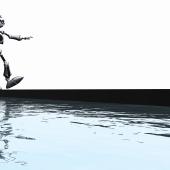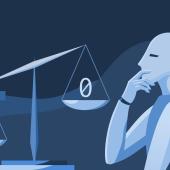I’ve always been fascinated by futurists — from science fiction writers like H. G. Wells and David Brin to nonfiction writers like Alvin Toffler, whose 1970 book Future Shock not only predicted the future but helped create it.
The title of Toffler’s book referred to a burgeoning concern that modern technological advances would be “too much change in too short a period of time.” Forty-six years later, that concern is still very real. In the short-term, however, I see technology giving us the ability to work much more efficiently, effectively, and independently, which should give us greater freedom to select the work that we do.
I thought it might be interesting to try to describe how the practice of corporate law might look just a few years down the road.
Working remotely
Back in the 1980s and ‘90s many people thought that the rising costs of office space, commuting, and technology would put pressure on companies to adopt the use of flex-time and work-from-home options. That didn’t occur as quickly as many people expected, primarily because the value of physically working in an office kept most employers and many employees from taking the plunge.
Many of those advantages have been eroded. The days where lawyers need library books, and computers need to be hardwired are long gone. We have tools now that allow excellent collaboration, tracking, and productivity from nearly any location.
Cracks in the in-office paradigm have also begun to appear. In our digitally connected society, many employers expect employees to work after hours, and that often means working from home. As a result, more and more employers and employees have begun to accept the notion of flextime and remote working arrangements.
The advantages of remote working arrangements to both corporations and their lawyers are clear. A corporation in a large metropolitan city can more affordably hire sophisticated lawyers who happen to live in areas where the cost of living is not as high. Lawyers who have been spending several hours commuting every day can regain some of their work-life balance simply by recouping that time.
There are broader implications too. The full-time employment model made sense when employees needed to be physically on premise and wanted full-time jobs for a paycheck, healthcare, and other benefits.
Those interdependencies are changing. As health insurance becomes more available and location becomes less relevant, a future where corporations maintain a group of trusted legal professionals that they can hire as needed is becoming a reality. As a result, lawyers will become an interesting hybrid of inside and outside counsel. In the near future, I can imagine legal cooperatives or networks offering the same benefits with much less overhead.
Legal services
I expect the nature of our services will change dramatically too. Those legal networks I mentioned before should be able to provide expert services at a much lower cost, which will allow some corporations to use more of them.
Clients will also want more self-service tools. Smart-guides, curated legal wikis, and automated contract assembly will not only make our practice of law more efficient, but it will also ensure that routine legal work can be done by the clients themselves.
Data analytics will also play a major role. When counsel on both sides are better able to predict litigation outcomes, suits will be settled much earlier and at less transactional expense.
A.I. legal assistants
Personal assistants powered by artificial intelligence have long been a staple of science fiction. Characters like Hal in 2001 used to seem far-fetched. But Siri, Alexa, Cortana, and the Google Now assistant have become increasingly useful. I already use them to make and read calls and texts, answer questions, and make calendar appointments. I don’t expect true artificial intelligence for quite a while, but these tools will quickly be able to make our work easier and more efficient.
These are just some of the things I see on the near horizon. Please let me know what you predict.




